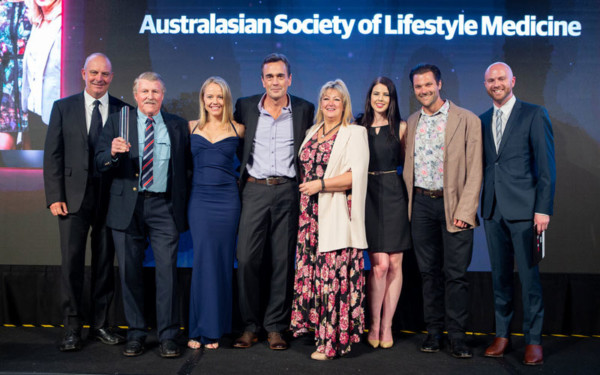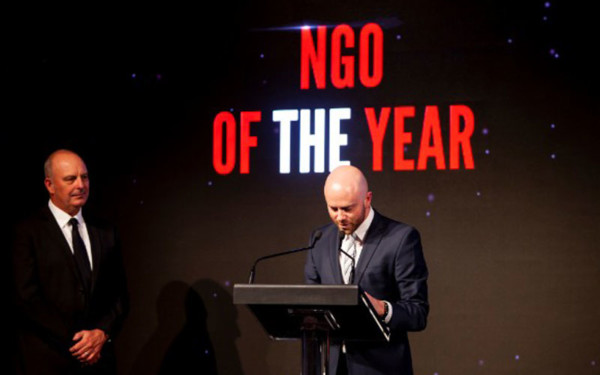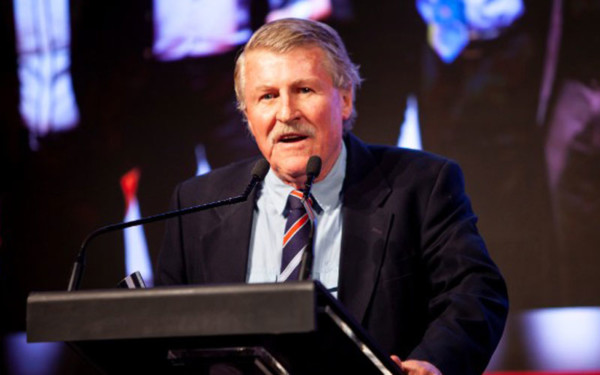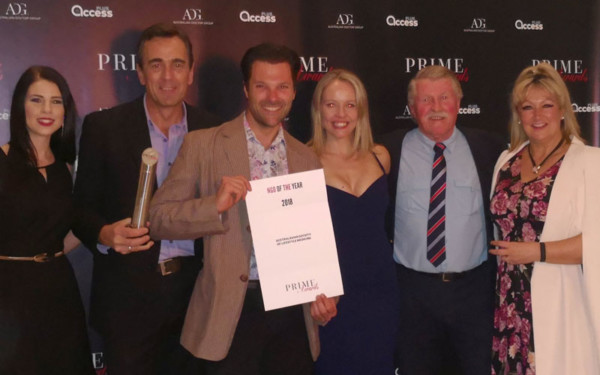
Australasian Society of Lifestyle Medicine named NGO of the Year at PRIME Awards [Media release]
In recognition of excellence in improving the health of Australians, the Australasian Society of Lifestyle Medicine (ASLM) was awarded NGO of the Year at the 2018 PRIME Awards in Sydney, on Thursday 20th September. [Members of the ASLM board and management team accepting the award on Thursday night pictured above].
The PRIME Awards, now in its 14th year, recognise excellence in healthcare communications, public relations, marketing, corporate social responsibility, education, public health initiatives and patient/customer support, with the NGO of the Year award newly introduced in 2017 and first awarded to Bowel Cancer Australia.
The purpose of the NGO of the Year award is “to recognise the huge contribution that non-government organisations (NGOs) make to the quality of Australian healthcare” with a key criteria being “to improve the lives of Australian patients”. The Movember Foundation and EndoActive were also shortlisted for this year’s award, demonstrating their profound contributions to the health of Australians.
“We are humbled to be in such esteemed company and honoured to have been recognised by the industry for our dedication and innovation. There’s no doubt that we were nominated for our work pioneering Shared Medical Appointments into clinical practice and for this we especially thank Prof Garry Egger and A/Prof John Stevens who have led the way,” says ASLM President, Dr Sam Manger.
“Lifestyle Medicine is one of the best medicines we have for chronic disease, and ASLM is steering our healthcare system towards better addressing the cause – and the cause of the cause – often the social and environmental drivers of poor health,” Manger adds.

“And the winner is….”

Prof Garry Egger accepting the award
Growing exponentially around the globe, Lifestyle Medicine is both a discipline and a movement for change – providing a comprehensive, multidisciplinary, whole system approach to the chronic and lifestyle-related disease epidemic. Lifestyle Medicine promotes evidence-based innovation in clinical practice, in community settings and through public health initiatives.
The award highlights the importance of ASLM’s work to address the increasing burden of chronic disease facing our healthcare system, and recognises the collective efforts of it’s volunteer board, staff, members, pro-bono contributors and donors, to position Lifestyle Medicine as central to clinical practice, healthcare and health policy. Founded in 2008, ASLM is a fully multidisciplinary society in which medical doctors, allied health practitioners, public health professionals, scientists, researchers and educators all have an equally important role to play.
ASLM Executive Director, Stephen Penman, explains, “70-80% of GP consultations now relate to chronic and lifestyle-related conditions. However, most chronic conditions share common risk factors and the science shows that practitioner-led intervention and community-based ‘lifestyle-change’ programs can be highly effective. Reversal of chronic disease through the modification of behavioural, environmental and social factors is not only possible, but a practical reality.”
“Recognition as NGO of the Year for our work in this area reaffirms the need for innovation in clinical practice, community and public health initiatives, ultimately, improving the health of Australians and New Zealanders,” Penman concludes.

After shot on the media wall

PRIME Awards 2018
About ASLM
The Australasian Society of Lifestyle Medicine (ASLM) is a multidisciplinary society working towards improved prevention, management, and treatment of chronic, complex and lifestyle-related conditions. ‘Lifestyle-related’ includes environmental, societal, behavioural and other factors. ASLM members include GPs and medical specialists, allied health practitioners, public health physicians, educators, scientists and researchers.
Together, we advocate for a multidisciplinary, multi-system approach to the chronic and lifestyle-related disease problem, and for a comprehensive understanding of health and wellbeing, that is, not just the absence of disease, but for vibrant health with meaning and purpose, for health equity, social justice, corporate responsibility and environmental sustainability.



